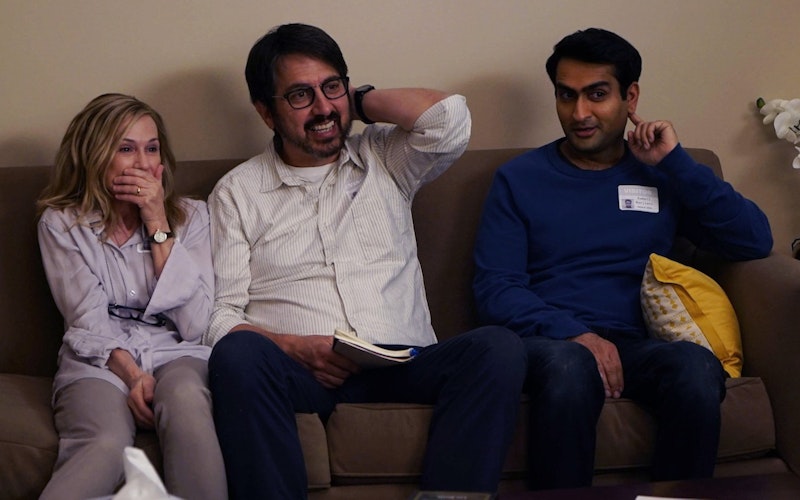
Movies
The Big Sick’s Ministry of Presence
One of the most powerful things a film can do is take us into the small sacred spaces that exist in the quiet moments between people, where we can witness a ministry of presence. The Big Sick is defined by these sacred spaces, each one offering a different experience of family, loss, and healing.
Screenwriters Kumail Nanjiani and Emily Gordon based The Big Sick on their own relationship, in which they navigated the cultural differences between them and also faced a daunting experience that came to define their love. It is a formulaic romantic comedy in some ways, yet it also draws the audience into the characters’ lives by focusing on particular places, and the intimacy that makes them sacred.
The first space is the comedy club where the main character—played by Nanjiani and also named Kumail—performs. There is a sense of community and intimacy among Kumail and his fellow comedians, emphasized by the dark, small area backstage where they frequently gather together. Yes, there is anxiety and anticipation, yet this space is also defined by the little family Kumail has formed, which supports each other professionally and personally. In an especially moving scene, the stage becomes a confessional; Kumail loses his usual composure and begins to divulge all of the things that are weighing on him. Even as the dark backdrop and the bright spotlight expose his vulnerability, his family of comedians offer affirmation from offstage.
Another space we are invited to witness is that of the dinner table where Kumail’s biological family gathers. Kumail also engages in a sort of performance here, playing the role of the dutiful son for his Muslim Pakistani mother. There is good humor here, especially when Kumail’s mother receives young women as potential partners for him, pretending it is all a surprise to her. We too are seated at this table, watching the nuanced glances among family members. Once Kumail explains that he is in love with Emily (Zoe Kazan), a white woman, and that he no longer prays or finds Islam meaningful, Kumail is not invited to these dinners anymore. He becomes excommunicated and the pain of that hangs over him. Having this place where he can belong is important to him, yet he risks it for the sake of Emily.
The Big Sick demonstrates a different kind of love: agape, a self-giving love.
The third space is defined by family as well, though not Kumail’s. (Warning: spoilers ahead.) After Kumail and Emily break up, she is rushed to the hospital for mysterious reasons. Her friend calls Kumail because no one else is available. He waits there until the arrival of Emily’s parents (Ray Romano and Holly Hunter) and then feels compelled to stay. While they keep vigil, the camera staying close to the characters so that we can see the isolation and tension they feel, they are eventually drawn into a space of shared pain and brokenness. As the relationship between Kumail and Emily’s parents develops, the camera gathers them in the same frame. Eventually, an otherwise sterile and possibly antagonistic environment is transformed into a sacred space filled with grief, pain, and healing.
Kumail’s decision to stay, sit, and wait demonstrates a ministry of presence, a sacred call to be with others in their suffering. Dutch theologian Henri Nouwen wrote that “when we experience the healing presence of another person, we can discover our own gifts of healing. Then our wounds allow us to enter into a deep solidarity with our wounded brothers and sisters.” Even though Emily is the patient, these three people in the waiting room are also wounded and in need of healing. In this sacred space, in the waiting together, Kumail begins to reconcile his love for Emily with his sense of obedience to his family. For Emily’s parents, they not only have to deal with the grief of a possibly dying child, but also their relationship with each other.
The Big Sick is certainly a love story, but “love” can mean so many things. Most romantic comedies are about romantic or erotic love. Although The Big Sick starts off as a story about romance, in that hospital waiting room—in that sacred space—Kumail demonstrates a different kind of love: agape, a self-giving love. Kumail leaves behind his identity, family, and possibly his career to be there for Emily and her family. It’s an act that exemplifies kenosis, an emptying of self—in the manner of Christ—and a willingness to share in others’ suffering.
In these moments, Kumail finds what Nouwen describes as “the quiet joy of being there for someone else and living in deep solidarity with our brothers and sisters in this human family. Often this is a solidarity in weakness, in brokenness, in woundedness, but it leads us to the center of joy, which is sharing our humanity with others.” Most romantic comedies end with a declaration of affection, a kiss, or a wedding, but The Big Sick stands witness to the power of solidarity, and the quiet joy of being present.
Topics: Movies, Culture At Large, Arts & Leisure